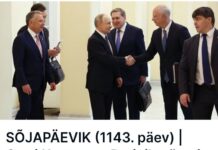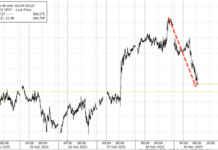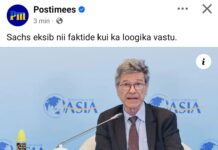President Putin said in response to Ukrainian shelling last week that “This [demilitarized] line should… lie at such a distance from our territory that it would ensure the security [of Russian cities].” He added that it needs to protect the population from the “foreign-made longer-range weapons that the Ukrainian authorities use to strike peaceful cities.” These remarks about a “demilitarized zone”, which RT also quoted him as having said, suggest flexibility in any potential peace talks.
The Russian leader has repeatedly said that the Ukrainian Conflict can swiftly end upon Kiev complying with his country’s requests to demilitarize, denazify, and return to its constitutionally neutral status, absent which it’ll continue fighting on the battlefield in pursuit of those interconnected goals. The challenge, however, is that only a game-changing breakthrough along the Line of Contact (LOC) together with the rapid collapse of the Ukrainian state and no NATO intervention in its support can achieve this.
Russia is winning the “race of logistics”/“war of attrition” with the West by far and is thus much better positioned for a protracted conflict, but it would of course prefer to meet its goals sooner than later, thus enabling it to redivert some of its military expenditures into socio-economic projects. That’s a sensible enough stance, though it shouldn’t be spun by “doom-and-gloom” conspiracy theorists like Igor Girkin’s kind as signaling an impending capitulation, which Russia won’t consider under any circumstances.
Nevertheless, it shouldn’t be ruled out either that President Putin might eventually become more flexible towards one, some, or all three of his country’s previously stated goals in this conflict, such as countenancing a “demilitarized zone” as opposed to Ukraine’s complete demilitarization. The first is comparatively much easier to implement though it’ll still be a struggle without any game-changing breakthrough, while the latter could be preempted by a NATO intervention to secure a rump Ukraine.
Right before the end of the year, “Putin’s Admission Of Naivety About The West Signaled His New Stance Towards Peace Talks”, namely that he no longer assumes that they negotiate in good faith and will therefore continue pressing hard to ensure his country’s national security interests in this conflict. At the same time, however, he’s also not naïve about his country’s capabilities and the military-strategic dynamics of this conflict as were explained thus far in this analysis.
Therefore, it’s entirely possible that he’d consider a “demilitarized zone” some distance behind the LOC – far enough of course to protect the population from long-range Western weapons (some of which might be withdrawn in certain scenarios) – as part of a comprehensive compromise for ending the conflict. It can only be speculated what the West’s quid pro quo concession would be, but the point is that this meticulous leader’s conspicuous change of phrasing probably wasn’t an uncharacteristic faux pas.
Rather, the argument has been made throughout this analysis that he’s signaling flexibility in any potential peace talks, all with the intent of proverbially moving the needle of Western policymaking opinion a bit closer in that direction so as to end the conflict sooner than later. No one should forget that Russia will never agree to any outcome that doesn’t ensure its legitimate national security interests, however, thus meaning that whatever it ultimately decides upon shouldn’t be opposed by its supporters.






















